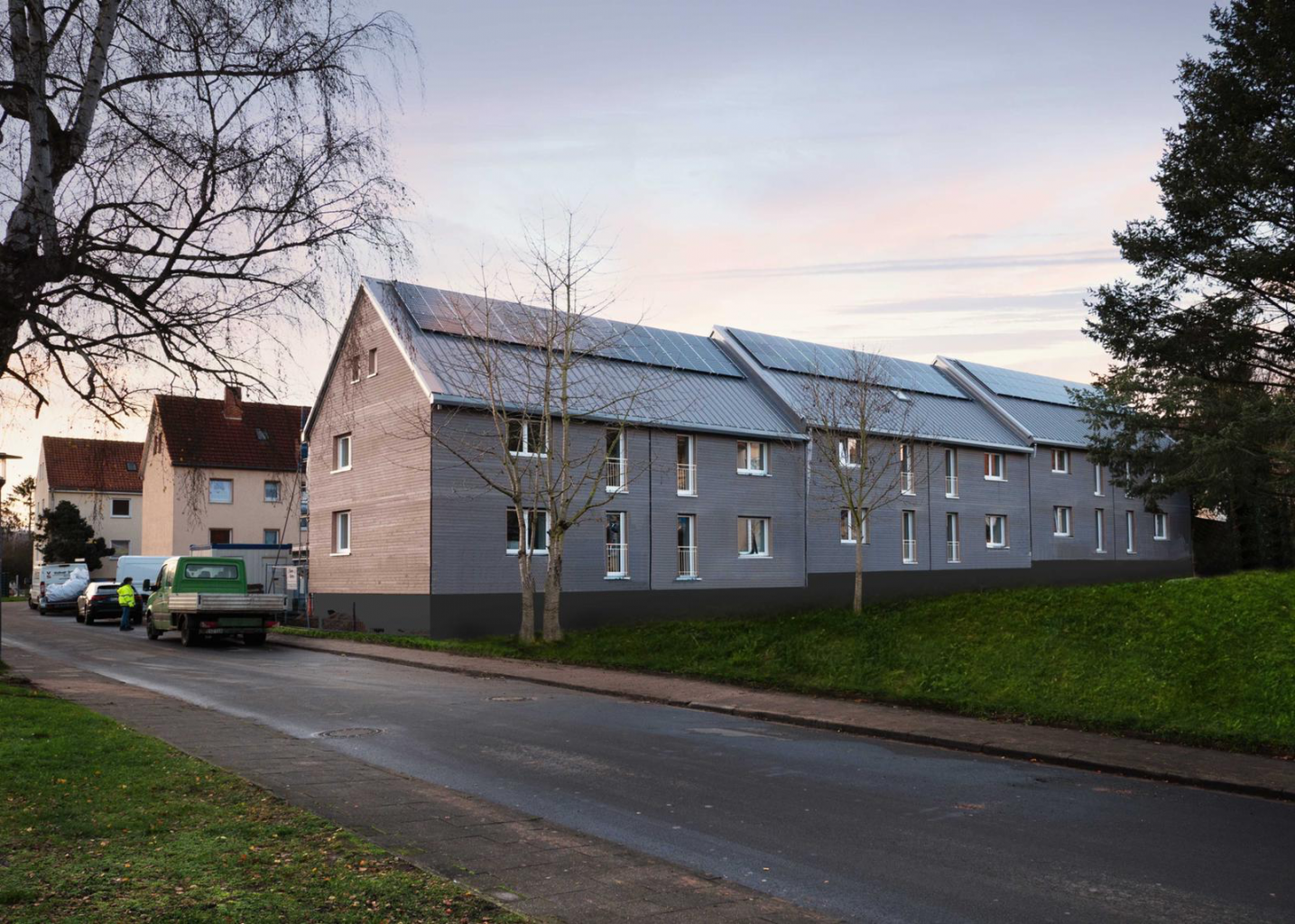Serial renovation: Germany’s first pilot project completed
Homes in Hameln modernised following the Energiesprong approach
In Hameln (Lower Saxony), the first building in Germany was serially retrofitted following the Energiesprong approach. Energiesprong is a new method for net zero energy renovation: using prefabricated roof and façade elements, as well as prefabricated building technology, buildings can be modernised quickly and in a climate-friendly manner. The innovative construction process brought the Hameln building up to the climate-friendly NetZero standard. The German Energy Agency (dena) is responsible for launching serial renovations in Germany on behalf of the Federal Ministry for Economic Affairs and Energy (BMWi) and supports companies in planning and implementing pilot projects.
The 1930s Hameln apartment block, consisting of three building sections with two floors each, was previously in great need of renovation. Almost all of the twelve apartments in the apartment building are now rented. Since the renovation, the building has achieved the climate-neutral NetZero standard: a photovoltaic system on the roof generates as much energy over the year as is required for heating, hot water and electricity. Over 500 sensors installed in the house evaluate the consumption data and help to optimally-control the heating supply and ventilation of the building. A heat pump and a heat recovery ventilation system complete the innovative building technology. Now the serially-renovated building can prove itself in operation and show that the Net-Zero standard works.
Ecoworks GmbH, provider of CO2-neutral and serial renovation in Germany, coordinated the implementation as a total solution provider. A prefabricated construction company from Brandenburg prefabricated the façade elements. Windows, ventilation, power cables, fiberglass insulation and coatings were already integrated into the elements. They were installed on site as a new shell on the house. The house is owned by the Arsago Group.
Thomas Bareiß, Parliamentary State Secretary in the Federal Ministry of Economics said: “Around 35% of Germany’s total final energy is currently consumed in buildings, especially for heating and hot water. A lot of energy can be saved by renovating the energy efficiency of buildings. The Federal Ministry of Economics already supports renovation measures for buildings with a large number of funding measures. In 2020, we made 8.5 billion Euros available, triggering an estimated investment of 83 billion Euros through KfW’s support measures alone. Serial renovation is a new component in this package. It enables buildings to be quickly renovated using prefabricated elements. This is attractive for the real estate industry, for owners and also for tenants”.
Andreas Kuhlmann, Chairman of dena management said: “The pilot in Hameln is a milestone in the market development of serial renovation solutions. A house in great need of renovation has become an affordable, climate-friendly and high-quality home. The pilot makes it clear that innovation in the construction sector pays off. The experience gained here can be used to gradually improve technologies and processes. Scaling and innovation will keep costs down. This is how we get step-by-step from the pilot phase to serial production. A future-oriented and profitable market is currently emerging for companies in the construction industry. After the upheavals in mobility and renewable energies, the construction industry must now deliver the next major climate protection innovation”.
Florian Schrage from Arsago said: “As owners, we are very satisfied that we have actually succeeded in implementing the first project of this kind in Germany. I am also particularly pleased that we were able to set an example for energy transition here in Kuckuck, Hameln with its eventful history. This pilot project was the much-cited “great challenge” as anticipated, but in my opinion we have achieved a convincing result both technically and creatively, which I hope will be followed by many people”.
Emanuel Heisenberg from Ecoworks said: “We are proud to have implemented the first serial renovation in Germany and to have renovated three comfortable, CO2-neutral buildings for the owner and the tenant. Now it is time for us to use the experience and data to further develop the serial solution”.

About Energiesprong
In Germany, Energiesprong is coordinated by the Deutsche Energie-Agentur GmbH (dena). In close cooperation with the construction and housing industry, dena develops the redevelopment concept for the German market, brings companies together and advocates optimal framework conditions. The project is financed by the Federal Ministry for Economic Affairs and Energy (BMWi) and supported by the GdW Federal Association of German Housing and Real Estate Companies. Implementation of the first pilot projects is funded by the EU INTERREG NWE programme as part of the “MUSTBE0” project. This also includes the project in Hameln. Dena estimates the potential number of small to medium-sized apartment buildings from the 1950s to 1970s in Germany to be around 300,000 buildings. Further pilot projects will be implemented in 2021.